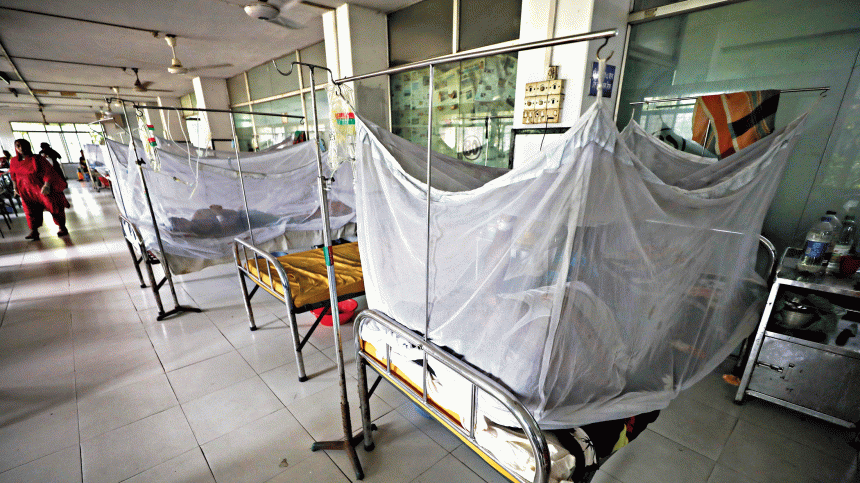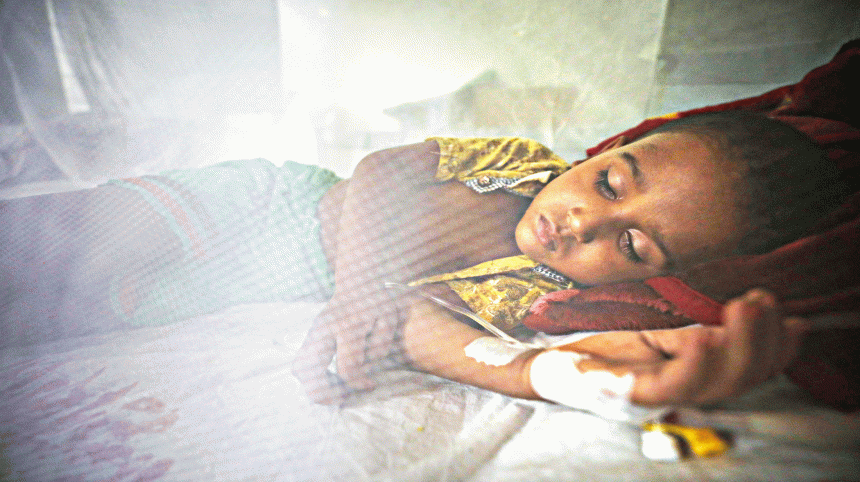Dengue hits the port city hard

With the number of patients increasing every day, dengue has already become a menace in Chattogram this month. And if proper actions are not taken, the outbreak threatens to wreak havoc in the region.
Around a hundred patients have been detected on average every day in Chattogram. For example, a total of 103 patients were detected on Sunday, 80 patients were detected on Saturday, 84 patients were detected on Thursday and 91 patients were detected on Wednesday in Chattogram.
With number of patients increasing, the death toll of patients due to dengue is also increasing.
A total of nine patients died of dengue in the first six months (between January and June) in this year while a total of 37 patients died in the next two months (between July and August) taking the year's death toll to 46 in dengue till August 20.
On August 20, a total of two patients died of dengue while on August 19, a total of three patients died of dengue in different hospitals in Chattogram.
A total of 500 dengue patients were admitted to hospitals in Chattogram in the first six months. However, since July, a total of 3920 dengue patients were hospitalized pushing the number of patients to 4480 till August 21 so far in this year, according to the data provided by Chattogram Civil Surgeon Office.
Experts say the actual numbers may be multiple times higher as the official data are collected from hospitals. There are a good number of patients who take treatment in-house and in the private chambers of doctors.

At present, a total of 226 dengue patients were undergoing treatment at different hospitals in Chattogram.
Though the situation is alarming, the initiatives taken by the authorities including Chattogram City Corporation (CCC) and Directorate of Health to prevent the breeding of Aedes mosquitoes seem to be insufficient, say city dwellers.
A survey was conducted in the port city by a group of researchers from Chittagong University under the supervision of CCC in 2021 to find out the breeding spots of Aedes. The CCC, later, took steps to destroy the larvae in those areas.
However, no such survey was conducted in 2022 and this year so far.
Although a significant number of patients is found in rural areas this year, actions are missing to prevent the outbreak in those areas.
For example, around a hundred dengue patients have been detected in a single village named Sonaichhari of Sitakunda upazila this year but no anti-mosquito drive has been initiated in this village.
Contacted, Monir Ahmed, chairman of Sonaichhari Union Parishad, said they informed the upazila nirbahi officer and the office of Chattogram Divisional Director of Health Services, Chattogram but to no avail.
"We do not have logistic equipment to initiate an anti-mosquito drive ourselves," said the UP chairman.
The CCC, however, started a 100-day anti-mosquito crash programme on June 22. Later, CCC mobile court conducted some drives and fined some people as they found larvae of dengue in the surroundings of their abode.
According to civil society members and rights activists, the initiatives taken by CCC are too little, too late.
'The situation didn't become like this in a day. We, civil society members and media people, have continuously been saying and writing about the dengue danger. But the authorities didn't take proper actions," he said.
Contacted, Chattogram District entomologist Entajer Ferdous said the CCC staffers should spray insecticides to kill flying mosquito during the evening and dawn, adding, at dawn and pre-evening time is the best time to spray mosquito insecticides as a study found that density of mosquito remains highest that time.
Contacted, CCC mayor Rezaul Karim Chowdhury said the CCC conservancy workers were spraying medicines in the breeding grounds of mosquitoes.
Rezaul said, "The CCC alone cannot prevent dengue; mass awareness is a must in this regard," adding, "The city corporation workers can only kill mosquitoes outside the house. So we have to keep our respective homes and yards clean."
Contacted, Dr Md Mohiuddin, Chattogram divisional director of Directorate General of Health Services, said they have already started surveying different areas in the city to find out the dengue hotspots.
He said, during the survey, Aedes larvae were found in areas including Khulshi, Sadarghat, Firningi Bazar, North Kattoli, South Kattoli, Akbar Shah, Colonel Hat, Shulak Bahor and Chandgaon.
"We have informed the CCC about the hot spots of dengue," he said.

 For all latest news, follow The Daily Star's Google News channel.
For all latest news, follow The Daily Star's Google News channel. 



Comments